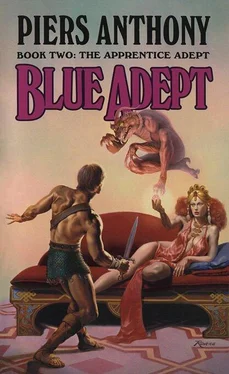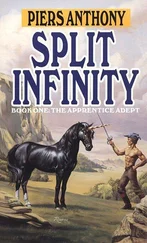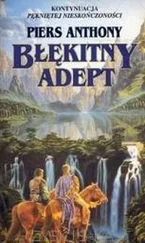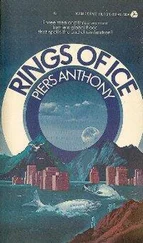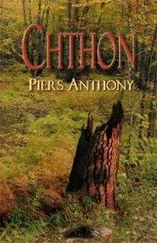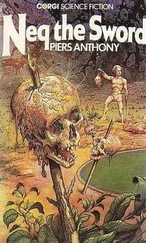Piers Anthony - Blue Adept
Здесь есть возможность читать онлайн «Piers Anthony - Blue Adept» весь текст электронной книги совершенно бесплатно (целиком полную версию без сокращений). В некоторых случаях можно слушать аудио, скачать через торрент в формате fb2 и присутствует краткое содержание. Год выпуска: 1981, ISBN: 1981, Издательство: Del Rey, Жанр: Старинная литература, на английском языке. Описание произведения, (предисловие) а так же отзывы посетителей доступны на портале библиотеки ЛибКат.
- Название:Blue Adept
- Автор:
- Издательство:Del Rey
- Жанр:
- Год:1981
- ISBN:9780808586548
- Рейтинг книги:3 / 5. Голосов: 1
-
Избранное:Добавить в избранное
- Отзывы:
-
Ваша оценка:
- 60
- 1
- 2
- 3
- 4
- 5
Blue Adept: краткое содержание, описание и аннотация
Предлагаем к чтению аннотацию, описание, краткое содержание или предисловие (зависит от того, что написал сам автор книги «Blue Adept»). Если вы не нашли необходимую информацию о книге — напишите в комментариях, мы постараемся отыскать её.
Blue Adept — читать онлайн бесплатно полную книгу (весь текст) целиком
Ниже представлен текст книги, разбитый по страницам. Система сохранения места последней прочитанной страницы, позволяет с удобством читать онлайн бесплатно книгу «Blue Adept», без необходимости каждый раз заново искать на чём Вы остановились. Поставьте закладку, и сможете в любой момент перейти на страницу, на которой закончили чтение.
Интервал:
Закладка:
Then he became more specifically aware of Clef’s playing. The man had started out in perfect conformance to the score, but Stile’s deviations had forced him to deviate somewhat also, for as a musician he could not tolerate the separation of efforts. The piece had to have its unity. Now, amazingly. Clef was making deviations of his own. Not by any great amount, but. Stile could tell, and it was certain the musicians on the panel could, and the Computer would be having inanimate fits. Clef certainly knew better; why was he doing it?
Because he was picking up the feel. Uncertainly at first, then with greater confidence. With dismaying acuity. Clef was following Stile’s lead, emulating him, achieving the same rapport with the human element. But Clef retained his special expertise. Already he was playing Stile’s way—better than Stile was doing himself. Stile had to retreat, to play “straight” in support of Clef’s effort; otherwise the integrity of the medley would suffer, and it was too fine as music to let suffer. Clef had preempted feeling. Now the medley swung into a classical fragment Stile recognized—the Choral Symphony—Beethoven’s Ninth.
Marvelous music never heard by the deaf composer. A beautiful piece—and Clef was playing his theme with inspired brilliance. Stile found his emotions split; part of him was sinking into resignation, knowing there was no way to match this, that he was in fact losing Computer, panel and audience votes, that he had washed out of the Tourney at last. The other part of him was reveling in the sheer delight of the Ode to Joy, of the finest playing he had ever done on any level, the finest duet he had ever participated in. Neysa’s horn was an excellent harmonica—but it had to be conceded that Clef’s instrument was a better one. The man was putting it all together in a way no other could. And—
Clef himself was reveling in it, moving his body dynamically, transported—as was Stile too, and the entire audience. What an experience!
The music ended. Slowly the emotion of the moment settled out of Stile. He descended from his high and came to grips with the onset of reality. He had, without question, been outplayed. If there was a finer musician in all the universe than Clef, Stile could hardly imagine it. Clef stood silent, eyes downcast. There was no applause from the audience. There was only the muted murmuring of the five musicians on the panel, comparing notes, consulting, arguing fine points. Stile wondered why they bothered; there was no question in anyone’s mind who had played better. Stile had only torpedoed himself, explaining the secret of feeling to his opponent; the man had caught on brilliantly. Yet Stile could not really bring himself to regret it, despite the consequence; it had been such a pleasure to share the experience. His loss on the slot machine had been degrading, pointless, unsatisfying; his loss here was exhilarating. If it were ever worthwhile to sacrifice a kingdom for a song, this had been the song. Something of miraculous beauty had been created here, for a small time; it had been a peak of performance Stile knew he would never truly regret. Better this magnificent defeat, than a cheap victory.
The foreman of the musicians signaled the Computer pickup. “Decision is ready,” the Computer’s voice came immediately. “This dual performance has been declared the finest overall rendering of the instrument of the harmonica, and is therefore ensconced in the Tourney archives as a lesson example. A special prize of one year’s extension of tenure is awarded to the loser of this contest.” Stile’s head jerked up. Salvation! This was the prize slated for those who made it to the next Round, that he had just missed. Not as good as a victory, but far, far better than a loss.
The odd thing was that Clef seemed to be reacting identically. Why should he be concerned with an award to the loser? He should be flushed with the victory. “The advisory decision of the Computer: Clef,” the computer continued after a pause. “The advisory decision of the audience, as recorded by tabulation of those receiving the broadcast of this match: Clef.” Yes, of course. Clef had won both the technical and social votes this time, deservedly. Stile walked across to shake his opponent’s hand.
“The decision of the panel of judges,” the Computer continued. “Stile.”
Stile extended his hand to Clef. “Congratulations,” he said.
“Therefore the Round goes to Stile,” the Computer concluded.
Stile froze in midgesture. “What?”
The Computer answered him. “Advisory opinions do not have binding force. Stile is the winner of this contest. Please clear the chamber for ensuing matches.”
“But—“ Stile protested, dumbfounded. Then he was drowned out by the tumultuous applause of the local audience, abruptly augmented by that of the speaker system as it carried the reaction of the larger, unseen audience. Clef took him firmly by the arm, leading him through the colossal din to the exit. Bemused, unbelieving. Stile suffered himself to be guided out.
A line of people had formed in the hall. At the head of it was the Rifleman. The Citizen grabbed Stile’s hand and pumped it. “Congratulations!” he cried. “Magnificent performance!” Then the others were congratulating him in turn, until Sheen got to him and began running interference.
Clef turned to leave. “Wait!” Stile cried. “You can’t go! This is all wrong! You won! Has the planet gone crazy?”
Clef smiled. “No, you won. I’m surprised you weren’t aware.”
“You should enter a protest!” Stile said. “You clearly outplayed me. I think you’re the finest musician on the planet!”
Sheen guided them to seats on the capsule home. “I may be so—now,” Clef said. “You showed me how to alleviate the major weakness in my skill. I owe it to you.”
“Then how—?”
Clef smiled. “It is a pleasure to have the privilege of educating you as you educated me. You recall how we played separately, to a split decision?”
“Indeed,” Stile said wryly.
“And how you then explained to me the manner music is a participatory endeavor? Not every man an island?”
“Yes, of course! You proved to be an apt student!”
“A duet is a joint endeavor. Each must help the other, or it fails.”
“Of course. But—“
“A man who plays well alone, can play better in company—if he has proper support. Harmony and counter-point enable a new dimension of effect.”
“Yes, I played better, because I knew you would make no error. Still—you played better yet. I think you improved more than I did.”
“I am sure this is the case. Because you provided more support to me than I provided to you,” Clef said. “I gave you merely good technical performance, at the outset; you gave me the essence of feeling. You showed me how. I was never able to accomplish it on my own, but in tandem with you I felt the living essence at last, the heart and spirit of music. I was infused by it, I merged with its potent pulse, and for the first time in my life—I flew.”
“And you won!” Stile cried. “I agree with everything you said. You and I both know you profited greatly, and played my way better than I ever played in my life. You went from student to master in one phenomenal leap! Surely the panel of judges saw that!”
“Of course they did. I have known all of the members of that panel for years, and they know me. We have played together often.”
And this panel of friends had given the match—to Stile?
Was it overcompensation?
The capsule stopped. Sheen took each man by the arm and guided him on toward the apartment. “Therefore you won,” Stile said. “That’s obvious.”
“Let me approach this from another angle, lest you be as obtuse as I was. If you play solo on one instrument and it is good, then play the same piece on another instrument of the same type and it is better, wherein lies the source of the improvement?”
Читать дальшеИнтервал:
Закладка:
Похожие книги на «Blue Adept»
Представляем Вашему вниманию похожие книги на «Blue Adept» списком для выбора. Мы отобрали схожую по названию и смыслу литературу в надежде предоставить читателям больше вариантов отыскать новые, интересные, ещё непрочитанные произведения.
Обсуждение, отзывы о книге «Blue Adept» и просто собственные мнения читателей. Оставьте ваши комментарии, напишите, что Вы думаете о произведении, его смысле или главных героях. Укажите что конкретно понравилось, а что нет, и почему Вы так считаете.
